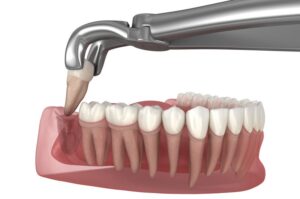
Every year, countless teenagers and young adults get their wisdom teeth removed. Are you soon going to undergo this procedure, or do you believe you may need it? You may find it beneficial to learn a bit more about wisdom tooth extractions and what you can expect in the near future. This blog post provides a basic guide that can prepare you for the road ahead.
Do You Need to Get Your Wisdom Teeth Removed?
Very often, wisdom teeth need to be removed because there is not enough room in the mouth to accommodate them. As they try to erupt, they can cause some significant problems:
- Impaction. When the wisdom teeth are stuck fully or partially beneath the gumline, they can cause pain and be more vulnerable to infections.
- Overcrowding. In some cases, the wisdom teeth place pressure against nearby teeth and cause overcrowding.
- Gum disease and tooth decay. Wisdom teeth are not always easy to clean. They may collect bacteria and food particles that cause tooth decay and gum disease.
- Cysts and tumors. Benign cysts and tumors sometimes form around impacted wisdom teeth.
An oral surgeon or qualified dentist can let you know for sure whether your wisdom teeth need to be extracted.
What Happens During the Procedure?
The details of the procedure can vary from case to case. At the beginning of your appointment, your oral surgery team will strive to make you comfortable by administering local anesthetic and, possibly, sedation. You should feel very little to nothing during your surgery.
Once you are settled in, your surgeon may be able to simply elevate each tooth, grip it with forceps, and gently remove it. If your teeth are impacted, though, it might be necessary for your surgeon to create incisions in your gums or break the wisdom teeth into pieces in order to remove them.
What Is the Recovery Like?
Most people are back to feeling normal within 1 – 2 weeks of their extraction procedure. In the meantime, you may experience swelling, light intermittent bleeding, and general discomfort. To support a successful and smooth recovery, you should:
- Get enough rest.
- Do not smoke.
- Do not use a straw to drink beverages.
- Maintain thorough oral hygiene, but be very gentle around your extraction sites.
- Eat a soft diet that is not too spicy or hot.
- Take medications as necessary to manage your discomfort.
- Follow all post-op instructions from your oral surgery team.
Wisdom tooth extractions are nothing to be afraid of! Talk to your oral surgeon if you have questions or concerns about undergoing this common procedure.
Meet the Practice
Drs. Steve Koo, Thomas Weil, and William Shepard are proud to provide comprehensive oral surgery services for our community. As board-certified oral surgeons, they have all the advanced skills necessary to handle even complex wisdom tooth removal cases. To learn more about them and how they may be able to serve you, contact Piney Point Oral & Maxillofacial Surgery in Houston at 713-783-5560.

